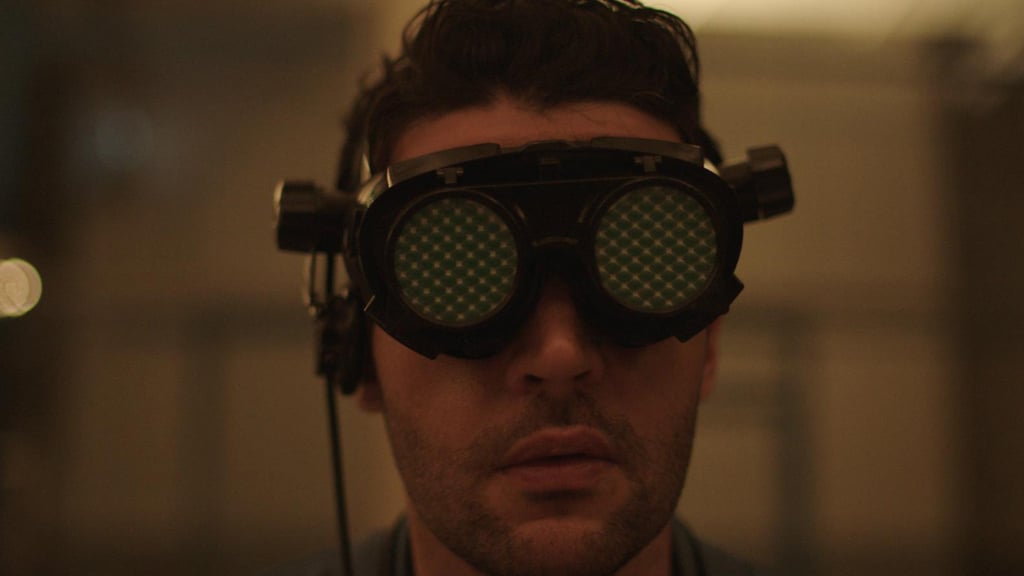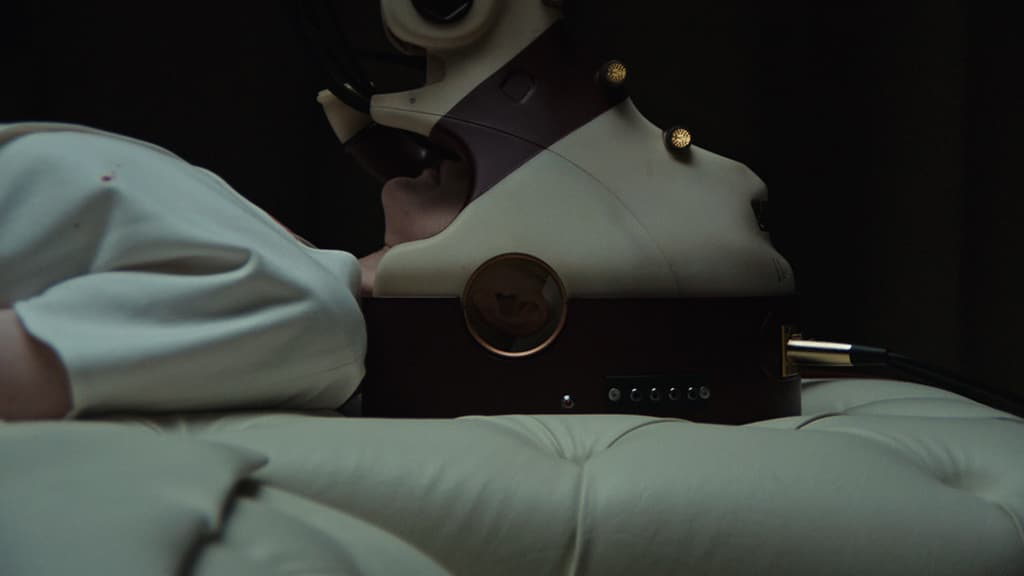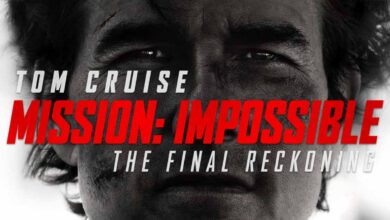Review: Possessor
A beautiful nightmare that feeds on every paranoid thought-spiral you’ve ever had, Possessor is the most exciting horror film I have seen in quite some time. In fact, it’s the best film of 2020 so far and stands to remain high on my list of the year’s best films.
When a contract comes through, assassin Tasya Vos (Andrea Riseborough) is sent in to eliminate her mark. However, she is no ordinary killer. Using a technological link, Vos is able to take control of people’s bodies and use them in order to get close to and kill her targets. But, a problem emerges; her mind is beginning to fracture. She is seeing flashes of past jobs and starting to lose control over the bodies she is inhabiting, not to mention her new incredibly violent urges. At the behest of her workplace, she continues to try and distance herself from her husband (Rossif Sutherland) and son (Gage Graham-Arbuthnot), but their images stick in her mind. When her boss, Girder (Jennifer Jason Leigh), sends her on a new assignment to kill a wealthy businessman (Sean Bean) and his daughter (Tuppence Middleton), and while in the body of Colin (Christopher Abbott), her fractured mind begins to form cracks where there was once only splintering. Now, she is in danger of failing her mission and losing her mind in the process.
It’s hard not to talk about the wonderful techno fear and body horror of Possessor without addressing its director, Brandon Cronenberg. His director-father, David Cronenberg, is famous for making films of a similar ilk, movies like The Brood, The Fly, and Videodrome. This movie feels like exactly the sort of thing the son of body horror’s most lauded director would make. However, it also feels distinct from past works, and it does not feel as though we are watching a rehashing of his father’s material. In a well-defined genre, it stands on its own. Brandon stands on his own.
The movie’s premise is rooted in modern paranoia, with technology providing a means to take control of your life and use you as a tool for the wealthy and privileged. Our protagonist, and everyone she works for are truly horrible. They are corporate greed manifest as kill-for-hire boogeymen and everything else the corporate world stands for; the pursuit of profit above all else, above everyone else. People are used as pawns without their consent as a means to execute targets, and discarded when they are no longer necessary. In fact, most of the big players in this movie are reprehensible. A large amount of the movie sees our protagonist aiming to ensure an inheritance for the already wealthy heir to a data-mining company. It’s all rather despicable.

In a movie filled with brutal acts of violence, one of the most disturbing scenes lacked any element of physical harm. Vos, as Colin, goes to work at his job in “The Mine.” He sits at a bench next to droves of others, wears a VR headset, and watches people’s webcam footage. His goal is to identify certain items in the background, in this case, the fabric of people’s drapes. This information is presumably collected, analyzed, and sold to any relevant company for a price. It was clinically upsetting. It’s a bleak future. Do we want to be commandeered by third parties in order to do their bidding, or do we want to be studied like lab rats in order to be sold things more easily? These are the options Possessor presents us with.
In fact, the whole movie posits a world in which we have lost our autonomy. There isn’t a giant monologue telling us that. But, the fact that all of these things are presented as normality suggests we have become thoroughly controlled by corporate influence. Technologically possessed patsys are just one way in which this is happening; although, you can’t help but imagine other, similar hitman services are available. But, it seems there is a company, or companies, in place to feed on each and every aspect of a person’s privacy and individualism, with Vos’ role simply being the most visceral and unnerving. As much as technology has progressed in this near-future, we have regressed. Human beings are back to feudalism and are under the thumb of despotism hidden in plain sight.
It’s a horrible business with horrible people and grisly consequences, yet you root for them. You want Vos to complete her missions successfully, even though she is only truly benefitting her unseen corporate bosses. In forming this connection with her, you are driven to wonder why she is so driven to carry out such abominable tasks. Why is she so determined to succeed in her field, at the exclusion of every other part of her life? Why is she so dead set on becoming nothing? This is the heart of the story; Vos trying to reconcile her life as a killer with her family life. You get the sense that her estranged family is the only remnant of a normal life she has left. Every other friend and acquaintance has fallen by the wayside. It’s her last connection to humanity. Although, you also have to question how much humanity she had to begin with. Is she losing her actual empathy or simply losing her manufactured empathy? It’s up for us to decide.

There are many sequences in the film that delve into abstractions, off-kilter images as a means of exposition. Vos’ struggles to keep control over her stolen bodies is a main implementation for this use of style. We see her float in and out of reality. Over time, she begins to lose control over Colin. He’s fighting back, and it’s becoming harder and harder to stop him. This is where you will either hang with the movie or fall off. You could describe these as vapid, a placeholder for ideas and themes, images that tantalize visually in the place of ideology or any semblance of intellectual conversations the movie could be having with the audience. However, I see them more as stimulating ways to discuss the topics at hand. They allow you to engage and decide for yourself what is happening to Vos, and perhaps more importantly, how you feel about it. You never know exactly when Colin is in control vs. when Vos is in control. You also don’t know what influence they have on one another. Who is responsible for their actions? It could be a combination of the two minds who are to blame, or not. The film is far more interested in what you think rather than any sort of concrete readings. What could have been a film built around expository dialogue is instead a visually rich, dense, and interpretive wonder.

Vos’ interest in violence is fascinating in its specificity. In particular, her desire to stab and maim. She repeatedly forgoes the use of firearms in favor of knives or other sharp objects, taking her time with the targets. Vos goes way beyond the task of simply killing them. She revels in it. When confronted about this, she gives a vague answer as to why. But, it seems that she doesn’t even know. This is complemented by alterations in her sexuality, and violent imagery seeping into her experiences. It appears as though she derives some perverse pleasure in what she does. For example, she envisions her estranged husband’s neck stabbed and bleeding during sex. Although, it isn’t that sex and violence are linked in a classical sense, that she is sexually fulfilled by her actions. Rather, it could be that her time in her work and a lack of all other influences have reduced her to her most primal of instincts. Without any genuine connection, and her primary activity being inhabiting others as a means to kill, she is losing touch with her humanity. In many ways, this movie shows us just how Vos is losing the last bit of herself, and in losing that, she loses any capacity to feel guilt. It shows her struggle to rid weakness from her life, to excise remorse from her personality. Vos has anger in her subconscious. She hates having to contend with her familial connection. We see her “line readings” and how she prepares to react to situations before they even happen; she puts on any persona necessary in that moment. This doesn’t just apply to her work but her family as well. Perhaps Vos has always been nothing. She has been whatever she needed to be at the time, but never anything concrete. Seemingly, who she is when she is working appears to be her default state. An empathy void. A perpetually malleable lump of clay that she can manipulate as she sees fit. Her family was just a lie she told herself, something she thought she had to do. If she can take that away, she becomes beautifully refined and specialized. All she has in life is this one, violent pursuit, and now she may not have anything holding her back from perfecting it.
Conclusion
Possessor is a movie to watch repeatedly. It’s a movie to mull over and analyze. It requires you to engage with it heavily to sort out what is happening beyond the basest aspects of the plot. If you are the type to be into that sort of thing, willing to go into someone else’s world and be challenged by it, you are going to love this film. As far as categorization goes, the simplest and closest to specificity is horror, but it’s operating on multiple levels and in several genres all at once. It’s a genre melting pot and a tricky balancing act, but it pulls it off beautifully. I was completely taken with it, and I both recommend it wholeheartedly and am anxiously anticipating a rewatch.
Review
Rating
RN Review of Possessor
Possessor is the best film of 2020 so far and stands to remain high on my list of the year’s best films.



